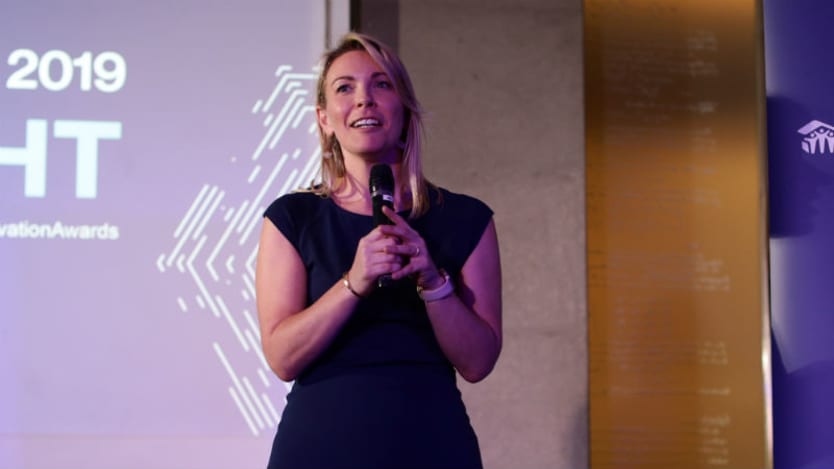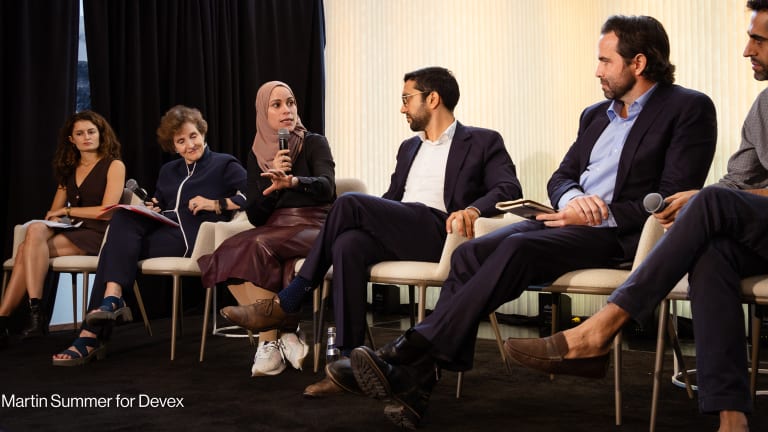
MANILA — For years, Habitat for Humanity has focused its attention on addressing the problem of access to finance for low-income households. The organization has spent time working with the financial industry targeting low-income families, such as microfinance institutions, rural banks, cooperatives, savings, and lending facilities.
The goal is to help these institutions realize that housing is a product that people needed and people wanted, said Jennifer Oomen, associate director on market systems and entrepreneurship at the Terwilliger Center for Innovation in Shelter. The initiative is led by Habitat for Humanity with support from business-philanthropist J. Ronald Terwilliger.
But the organization realized it’s not the only gap they have to address.
“We've stepped back and said, how can we make sure that when they get financed, they make the best improvements and the best investment? Because [for] low-income families ... [a house] is the biggest asset they'll ever own,” she told Devex.
A lot of families in the region often have a long-term vision for their houses. Often, it’s to pass down to future generations. So the challenge is to ensure that their houses remain standing even after the next typhoon or earthquake.
“What we find on the other market challenges for them is that, yes, materials are available, but is the labor high quality? Do they know how to use the latest innovations? Are they even aware of it?,” Oomen said.
But also, how do you help the market innovate and scale affordable housing solutions?
How this company is building sustainable bamboo practice in Myanmar
Bamboo technology in the housing sector isn't new, but Pounamu's emphasis on community and sustainability has earned the company its first Asia-Pacific Housing Forum Innovation award.
That led the organization to work not just with financial service providers, but also those providing materials for construction, associations, government entities and different kinds of private sector partners, including startups. In 2017, it launched ShelterTech Accelerator, first in Mexico, and then expanded it to Kenya and India. The accelerator helps businesses with groundbreaking new products and services in the housing space to receive business and mentoring support to scale.
They also set up the Shelter Venture Fund, which targets companies with disrupting ideas for the housing market to improve housing affordability and quality for low-income families.
Devex spoke with Oomen on the sidelines of the recently concluded 7th Asia-Pacific Housing Forum in Bangkok to learn more about the different ways they’re working with the housing market, the innovations that are emerging, and gaps in the space.
This interview has been edited for length and clarity.
Can you tell me a bit more about the ShelterTech Accelerator and Shelter Venture Lab Fund?
The transition for Habitat was really about, what are the ways that you need to work with the market? What really are the gaps? And what we found is that with ... a little bit of seed capital and mentorship, ecosystem connections and technical advice, we can help companies succeed.
We know tons of entrepreneurs do not succeed … But for entrepreneurs that are entering shelter as a space, you need to think about how can we help get them over that funding gap that they may have. And so that's where ShelterTech Accelerator came in. That's where our Shelter Venture Fund comes in. Those are different mechanisms or tools we have that can support the sector. So through the fund, we want to find interesting innovations, and seed them with capital that can help them grow.
And we don't just do that. We also, for instance, take a seat on the board and help advise the company toward success. And through the accelerator, we find companies that are pre-capital and say, “OK, you've got a good idea. It's fantastic. How can we help you to make connections, to get your business plan right, and to then get in front of investors?” Because we need to help them ... to be able to even talk about scale, otherwise it won't be successful.
How did you convince the different institutions, particularly companies, to get involved?
We use the global number in this case: 1.6 billion [people by 2025 will be without adequate housing]. When you think about the demand, we bring data, knowledge, and information to them and say, “look, this is an untapped market. These are people who are already going to the market to build and improve their homes, but you're just not targeting them.”
[One example is waterproofing in India. There are multiple issues.] One: labor. They were never formally trained, so they don't actually know how to properly apply waterproofing chemicals. Two: families. They know it's kind of important but they're used to doing patchwork. They're used to ... finding a patch solution.
We looked and we said, well, what's wrong with this process? Besides the fact that labor's untrained, who did the packaging? It's really dense chemically. We could rebrand this, right? Can you make … it something that targets low-income households where they're like, “oh right, this is something I need to do. And will be asking my mason for it.” At the same time, let's put the label in the local language.
We've really tried to apply empathy and using human-centered design to kind of turn issues on its head, and help companies understand those challenges that low-income families face, and understand the business opportunity. Because if it doesn't make business sense, they'll do it as only CSR. CSR is important. It's not the only thing. We're seeing lots of companies want to come in with shared value as the mantra. And I think that there's tremendous opportunity in the housing space for that.
I think that the sell with companies hasn't been hard. It's hard in some instances where they think you're an NGO, you want CSR. But at the same time when we sit down and really talk about it, and we show them what we're learning and then we learn from them, I think that they're quite excited to actually get involved.
The innovation awards that just took place did not only look at structure materials, but also other aspects of innovation in the sector, such as skills training for building homes. But is there an area where you have too much innovation? And an area where there's more that's needed but where not much innovation is happening at the moment?
People want to focus on hard technologies, right? Like a new brick, a new block. I think those are important. This is an industry ripe for disruption. It's an industry that, as people mentioned, it's a huge CO2 emitter, the construction sector. So I appreciate what people are trying to do to say, we can do this better and we can reduce its impact on the environment.
I think that though, the world is changing as well. In the Philippines for instance, what's the mobile phone penetration right now? You have to think about the other support services. So financial services don't just need to come through like banks, it can also come through mobile banking and mobile platforms. So what I have seen as a gap is not enough focus on the sort of fintech and sort of tech spaces that make those linkages easier for low-income households.
Now, I know in rural areas that penetration rate does drop off, but we need to anticipate that that's not going to always be the case. As the older generation ages, and the younger generation is suddenly the one making the investment choices for the family, you need to speak to them and help them in a way that links them up with good quality materials, labor, financing. And there are apps and platforms that we're seeing promising practices, but I haven't seen enough of that yet or ...not at the scale we want.
Even credit scoring, right? Think about what it takes to get a larger loan. There is still a really interesting range of potential in impact insurance. In disaster-prone areas, the impact of disaster coming more and more. How can we think about insurance mechanisms? ... How do you help insurance providers to provide that in scale? Because they need scale. That's why they're not doing it.
So I wouldn't say that there's too much or too little in any particular area, but I'd like to see us like pushing the boundaries a bit more, and not just saying, it's about bricks and blocks. It's about a lot of things. The poor have complex housing needs, and they deserve a suite of products, services, and financing ... so that they can make the best decision for their family long-term.
Housing is more than just the physical structure. It's more than four walls and a roof.
The whole idea that the housing is more than just the physical structure, has that been realized in the development sector? Because of the examples for NGOs working on water and sanitation, most of the time the focus is really just on WASH.
It's true. They don't work ... it's not necessarily close enough. And I think that housing is really a core livelihood need. It affects things like children's health. If you upgrade a floor from mud to something sealed like cement ... you reduce health bills, you reduce diarrheal disease. When you add solar panels and you deal with energy access, kids are able to study. Families are able to be more productive. So I think people think of housing in one way, but housing is about so much more.
At the end of the day, families feel really proud of having a home that they have invested in. And I think that that pride is hard to quantify. It's hard to talk about. But it's... important to say, “Hey, you know, we have a beautiful community and I have a beautiful house, and I'm raising my family and I am able to go to my job every day.” That's really about the journey, right, in the development sphere or spectrum.
Not enough has been done. I think more can be done, but I think that's where Habitat can play a role of saying it's not just about that.








